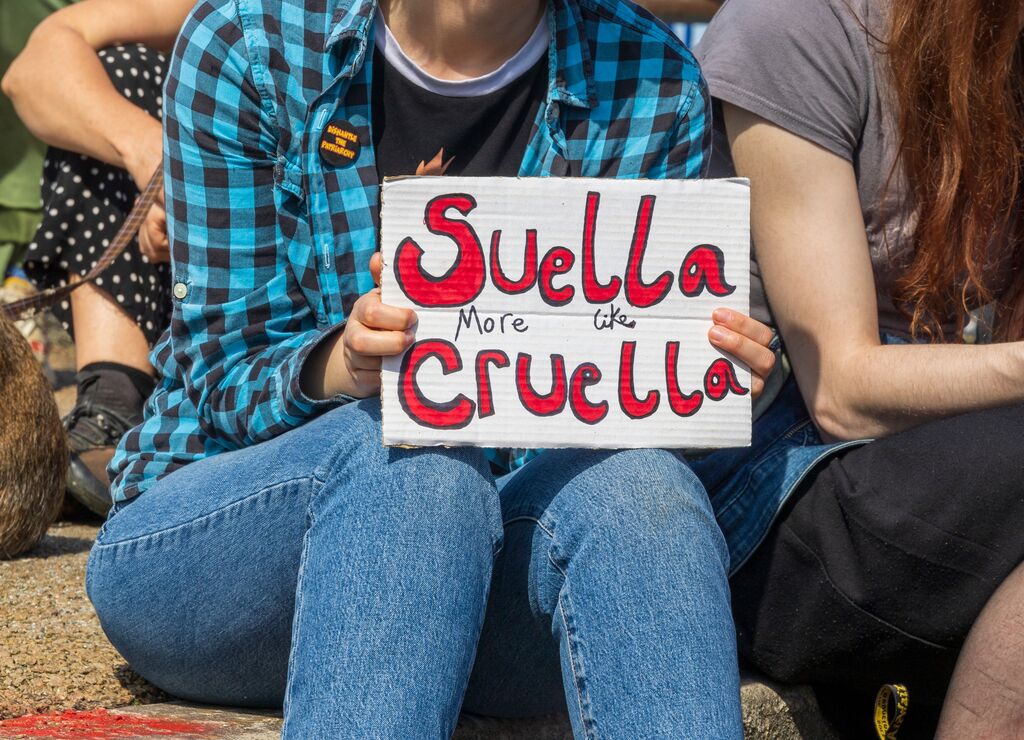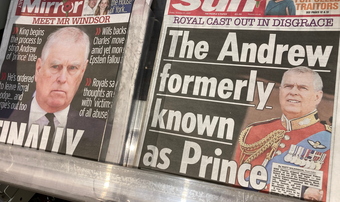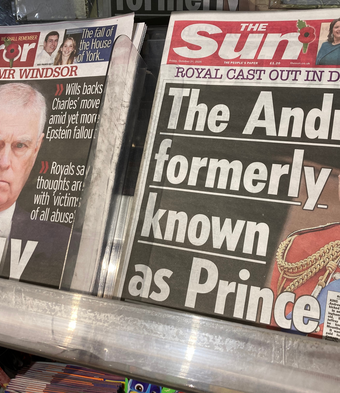Was Rishi right to sack Suella?

The following article represents the views and thoughts of its author. CARE is neither for nor against any one particular candidate or political party, but supports good government, wherever it is found.
Well then, who saw that one coming? No, I’m not talking about David Cameron’s shock return to political office (although oh boy, that was a turn up for the books!), but in just about the most predictable fall-out of the year, the uneasy alliance between Suella Braverman and Prime Minister Rishi Sunak ended in tears on Monday with her unceremonial sacking, after a run of what we might generously term ‘controversial’ statements from the Home Secretary in recent weeks.
Never one to go down without making her opinions felt (even if you agree with her!), Suella hit back on Tuesday, with one of the most explosive resignation letters (although quite why it’s called that after she’d been sacked, I don’t know!) one can imagine, even by the rather vicious recent standards of the modern day Conservative Party!
In truth, this marriage was always one which seemed likely to end in acrimonious divorce. The Home Secretary - who had resigned from that office a year before in the dying embers of Liz Truss’ government due to breaking the ministerial code - was a surprise backer of Rishi Sunak in the Conservative Leadership contest last autumn, having made some sort of deal to support him. She claims it was that support which won him the contest, which there is probably some truth in, although Sunak has always fared better with the Parliamentary Party (who ultimately had the vote) than with the Conservative Membership, who had rejected him just weeks earlier.
Being Home Secretary has always felt like a bit of a poisoned chalice, with its incumbent responsible for many of the most divisive issues within political life: immigration, crime, and so on. At times, in recent years, it has felt like a game of one-upmanship to see who can sound the toughest, from Theresa May’s ‘hostile environment’ policy to the Rwanda scheme, originally the brainchild of Priti Patel. Indeed, when I went to watch ‘Spitting Image - the Musical’ a few months ago, Miss Patel was, in the way Only Spitting Image can do, represented as a bloodsucking vampire (unfairly, I should clarify!). Poor Mrs Braverman fared even worse with the writers, floating ethereally around the stage as a spectral ghoul.
But even by the standards of her recent predecessors, Suella Braverman has been a divisive figure. On the one hand, she has said things some of us, and indeed some MPs, may have been internally thinking, but haven’t felt able to say. She has been looking to take on ‘The Blob’, to take the fight back to the ‘tofu-eating wokerati’, and to represent the forgotten majority.
But on the other…oh boy, on the other, her rhetoric has not only been inflammatory, at times in recent weeks it has (in my view) crossed over to being downright irresponsible, culminating in the far-right riots led by Tommy Robinson in the Capital last weekend.
- "I would love to have a front page of the Telegraph with a plane taking off to Rwanda, that's my dream, it's my obsession."
- "The British people deserve to know which party is serious about stopping the invasion on our southern coast."
- “We cannot allow our streets to be taken over by rows of tents occupied by people, many of them from abroad, living on the streets as a lifestyle choice."
It’s not for nothing that Suella has been labelled Cruella. Best keep an eye on your Dalmatians, everyone…
And the Conservative Party more generally? I lean to the right politically myself (although other parties are available!). I have personally never yet voted Labour (and am unsure what I will do next year). But in a week when David Cameron returns to front-line politics, his 2015 election slogan, “Britain faces a simple and inescapable choice – stability and strong Government with me, or chaos with Ed Miliband” looks increasingly like one of the great ill-fated prophecies, right up there with Alan Hansen’s prediction that Sir Alex Ferguson’s Manchester United would “never win anything with kids.”
Rishi Sunak is gambling that the sacking of Mrs Braverman (and the relative coup of bringing back Cameron) will increase his appeal to the liberal elites Braverman had been putting off, who have abandoned the Conservatives for the Liberal Democrats in their droves in recent by-elections. Not likely. I suspect all he is likely to achieve is driving away some of those who are on the right of his voter base into the arms of Reform, and that those he wants to appeal to are so fed up with the Conservatives that they won’t return to them for years to come. In the first poll seen since the Cabinet reshuffle, the Conservatives polled at 19%.
At this point, it really does feel like they are shuffling deckchairs on the Titanic, although instead of Kate Winslet surviving, it will end up being Jacob Rees-Mogg. And in some ways - and I say this as someone who is instinctively a Conservative supporter - that may actually be no bad thing. Any party tends to go somewhat stale after being in government for too long; and in the Conservatives’ case, they no longer seem to know what they stand for, with an existential divide between the centrist, liberal ‘Compassionate Conservativism’ of the Cameron era, and the populist Brexit-empowered bolshy bluster of Boris and the 2019 intake of MPs. “A house divided against itself cannot stand”, Jesus said. The Conservatives (and indeed Rishi Sunak) need to decide which one they are, for they cannot be both.
So was Rishi right to sack Suella? I suspect politically it won’t do much to help his prospects. But what is my view as a Christian? I recognise that we all have different consciences, and in that vein, some Christian MPs who I respect highly, such as Danny Kruger and Miriam Cates, were Braverman allies. But for what it’s worth, here is what I think.
Some points of agreement
I do understand why Suella is popular in certain quarters. While her support base may not be as big as she thinks it is (Ipsos’ poll found that only 17% of people disagreed with sacking her), her plain-speaking criticism of the liberal consensus did genuinely strike a chord with many who feel left behind and not heard by what they would perceive as a metropolitan elite.
She said in her resignation letter that she wanted to issue “unequivocal statutory guidance to schools that protects biological sex, safeguards single-sex spaces, and empowers parents to know what is being taught to their children.” Can’t argue with that one.
She said that “Multiculturalism has failed.” A sweeping statement, and one which you might think was contradicted by 3 out of the 4 Great Offices state being occupied by people from BME backgrounds at the time that she said it. But watching the protests and counter-protests in London in recent weeks, I really can see her point; never in my lifetime have I witnessed such intractable (and at times, visceral) disagreement between different cultures.
In one of her final interventions, she said that the police are “playing favourites”. Well, I’m not sure that a Home Secretary can publicly put political pressure upon the police and risk undermining confidence in the institution. But again, I would struggle to disagree with the point itself. We’ve already written at CARE about the inconsistency of the police arresting a Christian lady silently praying in her head outside an abortion clinic, while not arresting protestors for calling for ‘Jihad’.
There is nothing wrong with her view that Britain (or any other country) should be in control of who is entering its borders. There is nothing wrong with flagging that a substantial subset of the Palestinian protests has been anti-Semitic, with many chanting for the erasure of Israel (something I myself witnessed coming home from work this week). And ultimately, if she were (as she claims, and No. 10 hasn’t refuted it) given assurances by the Prime Minister on key policy priorities and he has gone back on those, there is nothing wrong with being angry at broken promises either.
So yes, there are points of agreement.
But I strongly disagree with the way Suella Braverman has expressed herself at times, even on some of the points we might find some commonality on, let alone on those where we wouldn’t agree...
A tone I strongly disagree with
I have some real concerns about who we are sometimes minded to ally ourselves with as Christians, in order to achieve the ends we want. It’s something I’ve written critically about within a US-context as well, where many have fallen in unquestionably behind Donald Trump, even to the point of believing conspiracy theories and participating in violent riots to overturn election results.
I’m not for one moment saying that is likely to happen here in the UK. I don’t think it is. And we often need to form alliances to be effective. But it is worth (and I’m gently addressing this to those who still support Suella) taking some real time to consider who you have got into bed with.
Yes, grace with no truth is weak and ineffectual. But truth with no grace is unloving, and is often just as ineffectual.
Ultimately, both fall short of the standards Jesus sets, for He was “full of grace and truth” (John 1:14).
Immigrants are not ‘invading’; these people are not our enemy, for us to fight a war against. Many of them have been trafficked: hence why at CARE, we were relieved to see the Rwanda plan be ruled unlawful this week: for modern slavery victims, the plan might have meant further trauma at the hands of criminals. Even for those who have wilfully come here illegally (and whom we might, quite reasonably, decide we cannot allow to remain, particularly given others come via legal routes), they are not an enemy.
Living on the streets, in the vast majority of cases, is not a ‘lifestyle choice’. Whether it be being trapped by extreme poverty, being caught in the throes of addictions, or being damaged by family breakdown, every case of homelessness is a tragedy, a human life (which began with the human hopes and dreams that we all have) which has gone awry.
When Jesus met with immigrants who had actually invaded Israel (such as the Roman centurion), he did not treat them with hostility, but with love, healing his servant. “Truly I tell you, in no one in Israel have I found such faith. I tell you, many will come from east and west and will eat with Abraham and Isaac and Jacob in the kingdom of heaven” (Matthew 8:10-11).
And during Jesus’ ministry, he was himself homeless: “Foxes have holes, and birds of the air have nests, but the Son of Man has nowhere to lay his head” (Matthew 8:20). Were He around today in 21st Century Britain, I honestly don’t know what Suella would make of him?
God has always had a special heart for the vulnerable; Old Testament scholars often talk about the ‘quartet of the vulnerable’: the poor, the widow, the orphan and the refugee. Our care for these groups is a mark of our Christian character. Punishment and marginalisation of them seems to have been the mark of successive Conservative Home Secretaries.
But even more foundationally, every human being, including those with whom we deeply disagree, from the most virtuous saint to the vilest offender, has been made in God’s image. Everyone has God’s infinite worth and value stamped indelibly within them. Any language which doesn’t reflect that is falling short of His standard. We must seek far better in our leaders.
So what now?
At CARE, we are not for any particular party, or any particular candidate. We are for good government, wherever it is found. And the proof ultimately is in the pudding.
And for all Suella Braverman’s strong words and macho rhetoric, what has she actually achieved?
The Rwanda plan - again - lies in tatters. She’s not been able to stop what she has called ‘hate marches’. Ultimately, her final actions seem to have done little more than inspire the far-right to charge on the Cenotaph last weekend, leading to more than 100 being arrested. It’s not enough to just sound tough, and to talk the talk; you have to walk the walk as well.
She leaves a legacy of division in her wake: a divided Tory party, and a divided country. “Multiculturalism” may have failed, but her brand of popularism certainly doesn’t unite anyone either.
Was it right to sack her? We will all have our different views, but - speaking in my personal capacity - I am glad she’s gone. There are far better spokespeople for the views and values I hold, who are just as clear whilst being more gracious and far less inflammatory.
Attention now turns to her successor, James Cleverly, and to the final months of this Conservative government before our next General Election.
Why not pray for the following?
Pray for our new Home Secretary and Foreign Secretary, that they might hit the ground running in their new roles and be granted wisdom and lead with integrity
Pray for the Government, led by Rishi Sunak, that it might make long-term decisions for the good of the country, rather than pursuing short-term party-political gains
Pray for our country, that the division which seems so rife might be healed, and that communities would listen and respond to one another with grace and love
Pray for our conversation, that we would all recognise that everyone, including those with whom we have deep disagreements, is made “in the image of God”, and is worthy of respect
Pray for our future in the UK, that whatever our next government, God might heal our nation and bless it, and that ultimately, He would lead many to a saving knowledge of himself
And it is difficult to know what to think anymore about British politics; but even when “we do not know what we should pray for as we ought, the Spirit Himself makes intercession for us with groanings which cannot be uttered” (Romans 8:26). In a world which feels ever more confusing and ever more polarised, where we really may not know what to pray for, thank God for that.






